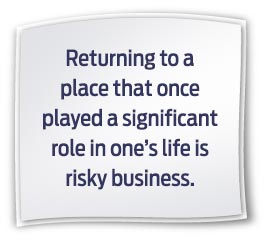
“Every once in a while, we need to go back to those sacred places to repent of our sin, renew our covenant with God, and celebrate what God has done.
“I wonder if Peter ever rowed out to that spot on the Sea of Galilee where he walked on water? Did Zacchaeus ever take his grandchildren back to climb the sycamore tree where he caught his first glimpse of Jesus? Did Lazarus ever revisit the tomb where he was buried? Did Paul ever ride out to the mile marker on the road to Damascus where God knocked him off his high horse? Did Abraham ever take Isaac back to Mount Moriah, where God provided a ram in the thicket? And I wonder if Moses ever returned to the burning bush, took off his sandals, and thanked God for interrupting the forty-year routine of his life by giving him a second chance to make a difference” (Mark Batterson, Wild Goose Chase, pp. 48, 49).
Returning to a place that once played a significant role in one’s life is risky business. What we remember most may not be there anymore. Buildings, even landscapes, and definitely people may have changed: a new high rise that took the space of a sparsely populated suburban or rural setting; a friend or former colleague who carries the scars of 20 years of life on a planet that mostly knows “downhill” or “decay”; a favorite pet whose exuberance and vivacious nature caused much delight—now just a shadow of itself and barely able to walk.
 There are many places that I would like to return to. I would like to go back to the mountain, somewhere in the Swiss Alps, where God called me to the ministry. I would like to see some of my friends from high school (not an Adventist one!) with whom I shared many heated discussions considering even the possibility of God’s existence and His love for a messed-up world. I would like to see again some of our friends—recently married couples—with whom we shared the annex (also known as “honeymoon suites”) on the campus of Helderberg College in South Africa 22 years ago.
There are many places that I would like to return to. I would like to go back to the mountain, somewhere in the Swiss Alps, where God called me to the ministry. I would like to see some of my friends from high school (not an Adventist one!) with whom I shared many heated discussions considering even the possibility of God’s existence and His love for a messed-up world. I would like to see again some of our friends—recently married couples—with whom we shared the annex (also known as “honeymoon suites”) on the campus of Helderberg College in South Africa 22 years ago.
Some weeks ago I got a chance to return. A preaching and teaching appointment brought me back to the campus of River Plate Adventist University in Argentina. Our family had spent five years in the little town surrounding the university. They were significant years. It was during that time that I received the devastating news that my father had suddenly passed away—under circumstances that caused lots of pain and heartache. Our youngest daughter was born in those years—a bright and sunny surprise that keeps surprising us. Those five years of interacting with hundreds of students, their friendship, enthusiasm, creativity, and growth, still inspire me today.
Returns can be moments of nostalgia, during which we tend to remember the good things and blend out some of the less-positive memories. Yet they can also be painful. Whatever the memories and experiences—we need to return if we desire growth.
As a church we often have mixed feelings about the past. Next year we will remember 150 years since the founding of the Seventh-day Adventist Church. It’s a bittersweet memory—how much we have wished to celebrate in heaven—and yet we are still waiting. Some of us spend lots of time hankering after the early period of the movement when pioneers sacrificially extended the border of God’s kingdom, one person at a time. At times this period is glamorized as the “good ole days.” On the other hand, there are Adventists who sense little or no link to the past of this church. They tend to be so engrossed in their culture and context that there remains little space for reflection and thoughtful retrospection.
So what’s the wild goose chase here? We need to find the right balance between yesterday (or 150 years ago), now, and tomorrow. No glorified past or exclusive focus upon contemporary culture will help us finish our job on this planet. We need to learn from the past and its challenges to face the now and our tomorrow. We need to return without staying in the past—and we need to do that as a community.
_________________________
Gerald A. Klingbeil is an associate editor of the Adventist Review. This article was pulibshed November 15, 2012.